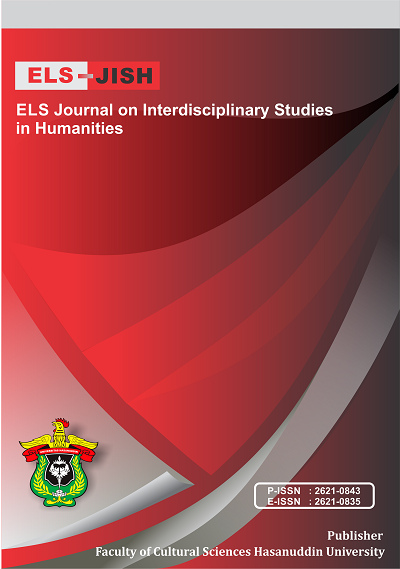Utilizing Online Dictionary Game to Empower Students’ Vocabulary Acquisition at Junior Secondary School: A Case Study at SMP Negeri 12 Tamalanrea Makassar
DOI:
https://doi.org/10.34050/elsjish.v5i4.24857Keywords:
Acquisition, Game, Improve, Online, VocabularyAbstract
Abstract
Vocabulary acquisition has been the main concern of the researchers around the globe but still little can be reported about what best strategies to enhance vocabulary learning. The main concern of the present study is improvement of vocabulary learning by means of online dictionary game one of the leading secondary schools in Makassar. The main objective is to help teacher empower their teaching aids in order to strengthen the ability of learners in improving their own lexical items beyond school instruction. A mixed-method research design was utilized in undertaking the research. Thirty (30) students were randomly selected out of a 120 total population of the second grade as the sample of the study. The quantitative method was obtained from pre-test and post-test result. Meanwhile, the qualitative method was obtained from the results of in-depth interview analysis. The results confirm that almost all students make a significant increase on the achievement of vocabulary acquisition after the intervention. This study confirms very strong assurance that online vocabulary learning utilizing dictionary provides a substantial basis for EFL successful teaching and learning in Indonesian context.The research bears significant pedagogical implications for Indonesian teachers to constantly push their students to use dictionary, notably online dictionary that they can easily access through their mobile phone.
Keywords: Vocabulary, Improve, Game, Online, Acquisition
References
Anggawirya, A.M., Prihandoko, L.A., Rahman, F. (2021). Teacher’s Role on Teaching English during Pandemic in a Blended Classroom. Proceedings of the International Joined Conference on Social Science (ICSS 2021), Atlantis Press SARL https://doi.org/10.2991/assehr.k.211130.083
Aoues, A., & Souaad, Z. (2020). Teachers' Attitudes Towards The Use of Pictionary Game to Teach Vocabulary.
Fadhilah, S. (2011). Teaching English Concrete Nouns Using Pictionary Game. Master's thesis.
Harmer, W., & Lely, L. (2019). Using Pictionary Game to Increase Learners' Vocabulary Mastery in English Language Instruction. Journal of English Education Studies (JEES), 2(1), 43-51.
Hasnia, H., Andini, C., Tahir, M. D., Hunaeni, H., Zulfikariandi, Z., & Muslimin, M. T. (2022). The Ability of 1st Class Students of SMAN 11 Enrekang to Arrange Verbal and Nominal Sentences. ELS Journal on Interdisciplinary Studies in Humanities, 5(3), 539-550.
Huyen, N., & Thu-Ngak, T. (2003). Learning Vocabulary through Games. Asian EFL Journal.
Jennah, R. (2009). Media Pembalajaran. Banjarmasin: Antasari Press.
Kartini, I., & Kareviati, E. (2021). The Students' Responses Toward The Implementation of Pictionary Game in Teaching Vocabulary to The Seventh Grade Students in One of Junior High School in Cimahi. PROJECT (Proffessional Journal of English Education), 4(3), 375-383.
Puspitasari, R. (2020). Hikmah Pandemi Covid-19 bagi Pendidikan di Indonesia. Skripsi.
Rahman, R. A., Choo, Y. B., & Li, K. L. (2016). The Use of e-Pictionary in Vocabulary Instruction.
English Teacher 45.3.
Sakti, I. (2019, April). Pengaruh Penggunaan Media Pembelajaran Berbasis Videoscribe Terhadap
Sukmawaty, Rahman, F. F., & Andini, C. (2022). Covid-19 Pandemic and Axiology of Communication: A Study of Linguistic Phenomena. International Journal of Innovative Science and Research Technology (IJISRT), 7(4), 1079-1087.
Pemahaman Konsep Fisika Siswa SMP Ittihad Makassar. Jurnal Fisika dan Pembelajarannya, 2,
Rahman, F. (2018). The Constraints of Foreign Learners in Reading English Literary Works: A Case Study at Hasanuddin University. Journal of Arts and Humanities, 7(2), 01-12.
Sugiyono. (2009). Metode Penelitian Kuantitatif, Kualitatif, dan R&D. Bandung: Alfabeta.
Syah, M. (2016). Psikologi Pendidikan dengan Pendekatan Baru. Bandung: Remaja Rosdakarya.
Warschauer, M. (2002). A Developmental Perspective on Technology in Language Education. TESOL Quarterly. https://doi.org/10.2307/3588421,
Christin, M., Hidayat, D., & Rachmiatie, A. (2021). Construction of Social Reality for Physical Distancing During the COVID-19 Pandemic. Jurnal Komunikasi. https://doi.org/10.24912/jk.v13i1.9612
Wright A, Betteridge D, and Buckley M. 1996. Games for Language Learning. Cambridge : University Press
Hadfield, J. (2010). Elementary Communication Games. Pearson Education.
Fadhilah, Siti. "Teaching english concrete nouns using pictionary game: An experimental study with the fourth graders of sdn 01 donowanguntalunpekalongan in the academic year 2010/2011." A skripsi in State Islamic Studies Walisongo, Semarang (2011).
Khoiriyah, A. N., Pangastuti, D., &Purwanto, W. E. (2020). Efektivitas Penggunaan Media Online Pembelajaran Daring Bahasa Indonesia selamaPandemiCovid19. Seminar Nasional Hasil Pelaksanaan Program Pengenalan Lapangan Persekolahan, UAD
Christin, M., Hidayat, D., & Rachmiatie, A. (2021). Construction of Social Reality for Physical Distancing During the COVID-19 Pandemic. Jurnal Komunikasi. https://doi.org/10.24912/jk.v13i1.9612
Wright A, Betteridge D, and Buckley M. 1996. Games for Language Learning. Cambridge : University Pers
Hadfield, J. (2010). Elementary Communication Games. Pearson Education.
Fadhilah, S. (2011). Teaching English concrete nouns using pictionary game (an experimental study with the fourth graders of SDN 01 Donowangun Talun Pekalongan in the academic year of 2010/2011).
Khoiriyah, A. N., Pangastuti, D., & Purwanto, W. E. (2020). Efektivitas Penggunaan Media Online Pembelajaran Daring Bahasa Indonesia selama PandemiCovid19. Seminar Nasional Hasil Pelaksanaan Program Pengenalan Lapangan Persekolahan, UAD.
Downloads
Published
How to Cite
Issue
Section
License
Copyright (c) 2022 Abidin Pammu

This work is licensed under a Creative Commons Attribution-NonCommercial-ShareAlike 4.0 International License.






